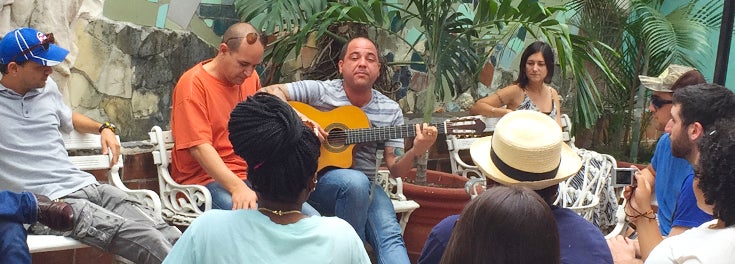
The doors to Cuba are finally opening, and University of Rhode Island students and faculty are among the first to enter. After more than half a century, the adversarial relationship between Cuba and the United States is easing, so URI has launched several initiatives that will bring students to the island nation for education, research and cultural exchanges.
Beginning next spring, students will be invited to spend a semester abroad at the Institute of Philosophy in Havana. From February through April, they will enroll in classes taught by Cuban professors on such topics as economic development and social movements in Latin America, introduction to Cuban society, the politics of Latin America, and political change in the Caribbean. Students will also complete an internship of their choosing that could involve writing, art, literature or music.
But it’s not all about academics. The rich and diverse Cuban culture is part of the package. In Havana, students will attend lectures by artists, diplomats, musicians and journalists and visit museums and other historic sites. In the countryside, they will stop at organic farms and tobacco plantations and participate in community events hosted by local villagers.
In addition to offering students the opportunity to travel to Cuba, URI is working to bring several Cuban musicians and professors to Kingston.
This semester-long program is a follow-up to last winter’s one-week class in Cuba—a class that will be offered again during J-term in January. When the first group of students returned to URI, they were eager to tell about their experience.
“The Revolution is very much alive in Cuba,” said May graduate Tyler Figgis. “They don’t have any commercial advertising—no ads for Coca-Cola, just billboards of Castro and Che Guevara. Not a lot of capitalism going on down there yet.”
“When I told people I’m from the United States, their whole demeanor changed,” added Jason Rosenblum, who also graduated in May. “They got really happy, especially the younger generation.”
Two things stood out for Jason: Cubans are highly educated, thanks to an excellent public education system, and they’re aware of what’s going on beyond their Communist-run island. “They’re not as isolated as people think,” Jason said. “They know about politics and music all over the world.”
In addition to offering students the opportunity to travel to Cuba, URI is working to bring several Cuban musicians and professors to Kingston. And the Graduate School of Oceanography is planning a series of marine science partnerships with the University of Havana, the National Aquarium of Cuba and the Cuban Institute of Oceanology.
“Cuba is facing many of the same environmental concerns that we are—climate change, sea level rise, erosion of beaches, ocean acidification, hurricanes—and we have expertise in all of these areas,” said Oceanography Dean Bruce Corliss. He envisions faculty and student exchanges, research collaborations and oceanographic expeditions in Cuban waters aboard the URI research vessel Endeavor.
When Gianelle Alba returned from her J-term trip to Cuba last year, she said she experienced a nation far different from the one she learned about in American history books. “I was taught that Cuba was a controlling, violent country. It wasn’t,” she said. “Cubans are the happiest people I’ve ever met. It was mind blowing.”
Photo above taken during the 2015 URI J-Term trip to Cuba.
